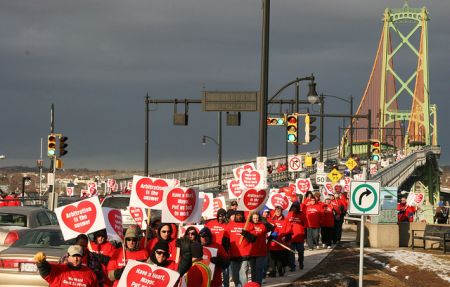On Feb. 2, 2012 the Halifax Regional Municipality saw the beginning of its first transit strike in 14 years. A lot of HRM residents and the general public were shocked that the city just remained on stand-by and decided to allow this strike to happen. I say this because a lot of HRM residents and the general public use the Metro Transit Bus services for various purposes. At least 50 per cent of bus users use the bus for traveling to and from school and work. Many other people use the buses for day to day errands, shopping, doctors appointments and for all kinds of other purposes.
According to different Metro Transit bus drivers, who I have personally talked to, I have received two different versions of the story as to why this strike is happening. The versions of the story I am getting are as follows:
1 – This strike is happening due to the selfishness of the president and members of ATU LOCAL 508. The bus drivers who told me that are also feeling that they shouldn’t be on strike.
2 – The other version of the story that I got is that the bus drivers do not want anything that is in their old contract taken away from them.
Other sources, who are city officials outside of Metro Transit, are telling me that the second version of the story is the truth.
Apparently the biggest issue, which I gather from all sources, is shift scheduling and the way it is carried out. The drivers with higher seniority want to continue being allowed to pick their own shifts. According to these drivers, who I had personally talked to, senior drivers picking their own shifts has been the scheduling system in Metro Transit for a long time and this system has always worked out well with no problems. Consider this factor: why would the city want to take this away from them?
I remember the first morning of the strike, Feb. 2, 2012, because I walked crossed the MacDonald Bridge for the first time in two years. I walked across at the exact same time when I would normally be taking a bus across (each and every morning). I noticed heavier than normal foot traffic for that time of morning. I know myself, along with many other HRM residents were upset that the city remained on stand-by and allowed this strike to happen. Since the strike started, the general public has felt the effects in more ways than one. Because of heavier traffic on the roads, it has been taking people longer than normal to get to work and other places they need to go. I know that since the strike started, my cousins who live in Sackville have been leaving one hour earlier than normal to go to work. My cousins normally take their cars to work anyway, however, now they leave one hour earlier than normal and still only arrive at work 10 minutes before their shift.
Anyway, hopefully the city will reach an agreement soon. Things will be so much easier on the general public and myself once the strike is over and Metro Transit is back to normal.
Update:
By talking to city officials and certain members of Halifax Regional Council, I have found out that council will be meeting behind closed doors every Tuesday after their regular meetings to discuss the strike. Hopefully this will make them come to an agreement sooner.
Many HRM citizens are concerned about this strike and hoping that it will be over soon. After all the strike is affecting 96,000 HRM residents.
Talks resumed on Feb. 8, 2012, and then broke off on Feb. 9, 2012 at 7am. Still no deal was reached between the city and the union.
Feb.14, 2012 the union asked for binding arbitration (a third party) to end the strike and drivers were willing to work under their old contract until an arbitration decision was reached (halifax.mediacoop.ca/audio/have-heart/9921).
The Halifax regional council said no to the offer of arbitration, prolonging the strike.
The biggest issue - causing this strike - is the scheduling system, which the HRM is proposing.
Kendall Worth lives in Dartmouth and writes for Street Feat – Atlantic Canada’s first street newspaper. He is a poverty activist and relies on the bus for transportation.



